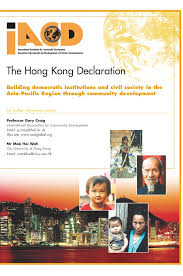Ten years ago, in June 2007, two hundred and fifty community development workers, academics, researchers, donors, policy-makers, and representatives from government, civil society organisations and community groups, met in Hong Kong, China at IACD’s international conference Partnership for People-Centred development: challenges and responses in a globalising world. The conference was organised jointly with NGO agencies concerned with promoting community development. Participants came from China, India, Japan, Malaysia, Pakistan, Philippines, South Korea, Taiwan and Thailand and many other countries.
Delegates emphasised that, at a time of rapid economic growth and political, social and ecological changes under globalisation, with many governments increasingly responding to political threats by limiting or even removing the civil and social rights of their populations, it was imperative that democratic life is strengthened substantially. A key outcome of the conference was the Hong Kong Declaration.
Ten years on IACD is gathering together papers from across the region in a Special Asia issue of Practice Insights magazine about what is going on now in community development and whether priorities have changed. This will be published in September.
Here are some of the key statements in the Hong Kong Declaration.
We believe that:-
“Community development is a way of promoting active civil society, sustaining peace based on justice, and creating democratic life by prioritising the decisions and actions of people, their communities, and their perspectives in the development of social, economic and environmental policy.
It is both a process and a goal. It seeks the empowerment of local communities, taken to mean geographical communities, communities of interest or identity, and communities organising around specific themes or policy initiatives.
It strengthens the capacity of people, men and women, as active citizens through their community groups, organisations and networks; and the capacity of institutions and agencies (public, private and non-governmental) to work in dialogue with citizens to shape and determine change in their communities, whilst also paying attention to equality, legitimacy and competence amongst partners.
It promotes the autonomous voice of disadvantaged, isolated and vulnerable communities. It has a set of core values/social principles covering human rights, social justice, equality, respect for difference and diversity; and a specific skills and knowledge base. It does not, however, substitute for the need for states to meet the basic level needs of all its citizens such as health, education, housing and income. Delegates acknowledged the priority now being given by some governments to strengthen civil society.
Community development plays an important role in supporting that process in a sustainable and cost-effective manner, whilst protecting the human rights of all. Delegates requested regional bodies and national and local governments, to commit themselves to work in genuine partnership, in building socially and economically inclusive, diverse, environmentally sustainable, gender-responsive and just societies.
This will ensure the structures, policies and mechanisms are in place to support dialogue and decision-making between national governments and civil society. This requires political and practical support for community participation, and appropriate legal, institutional and material conditions, but with specific support for the practice of community development itself”.
The Hong Kong Declaration stressed “the importance of community development in building mechanisms to eradicate poverty and promote the inclusion of all citizens – whether permanent, seeking permanency or migrant.
(Delegates) rejected the increasing levels of inequality within and between countries, growing manifestations of racism and xenophobia and the implicit discrimination manifested in many immigration and societal policies. They acknowledged the strengthening of social, cultural and economic life, consequent on peaceful interaction between different cultural, social and religious groups.
Delegates also emphasised the importance of developing mechanisms which could facilitate learning from people-centred practice amongst countries and territories, particularly drawing on the experience of those many countries and institutions where community development has played a significant role in addressing poverty and social exclusion, including in situations of conflict and peace-building.
Finally, they also stressed the need to understand the differing ways in which poverty, social exclusion and marginalisation may impact upon religious, cultural and national minorities and all disadvantaged groups, (e.g. women, children and older people), on migrants and on those living in rural as well as urban areas.
Delegates emphasised that the practice of community development strives to endorse and give voice to minority perspectives on policy and practice development, viewing this as integral to sustainable, inclusive and fair societies”.

